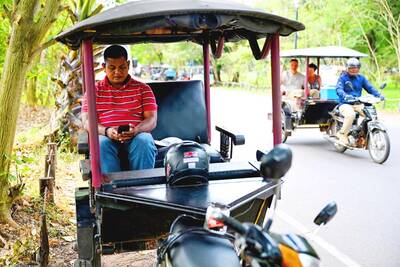Canada is set to become the first G7 country to legalize cannabis after lawmakers on Monday passed a bill that would allow free consumption of the mind-altering plant.
Passed by 205 votes to 82 in the House of Commons, the legislation must still pass the Senate — which could delay, but not block it — and receive royal assent by the governor general before becoming law, likely by September.
Legalizing weed was a 2015 campaign promise of Canadian Prime Minister Justin Trudeau, who has acknowledged smoking a joint with friends “five or six times,” including since being elected as a lawmaker.

Photo: AFP
The Liberal government’s pointman on the pot file, Bill Blair, on Sunday said it was “probably looking at a date of implementation somewhere toward the beginning of September, perhaps mid-September.”
Uruguay approved the recreational usage of marijuana five years ago and nine US states and Washington have done so too, but Canada would be the first G7 country to take the step.
An initial target of July 1 was set for ending the pot prohibition that dates back to 1923, although it was effectively legalized for medical use nearly two decades ago.
Despite setbacks, Trudeau has insisted his government would move to legalize the production, sale and consumption of the psychoactive drug before facing the electorate again next year.
Last week, the government rejected 13 out of 46 amendments to the bill proposed by the Senate after several months of study, with Trudeau’s health minister rising to defend home cultivation of cannabis and branded pot swag.
“Canadians are allowed to make beer at home, or wine,” Canadian Minister of Health Ginette Petitpas Taylor said at the time.
“It is already possible for Canadians to grow cannabis for medical purposes and we absolutely believe the legislation should be consistent when it comes to recreational cannabis,” she said.
The government would follow its expert panel’s recommendation to allow at-home cultivation of up to four pot plants for personal use, she said.
As for the proposed advertising restrictions, the bill already contains limits such as a requirement for plain packaging, she said.
Once the law is enacted, Canadians over the age of 18 (19 in some regions) would be able to buy 1g of pot for about C$10 (US$7.56) or less, from a patchwork of authorized private and public retail stores or by mail order, with each province and territory responsible for setting up distribution.
Personal possession would be limited to 30g.
Statistics Canada has estimated that the market would be worth C$5.7 billion, based on last year’s consumption data.
Canadian Minister of Finance Bill Morneau estimated the cannabis tax haul would be about C$400 million, but Ottawa has agreed to retain only 25 percent of the money, with the rest going into provincial government coffers.
In an interview with Agence Presse-France last month, Trudeau said the world was closely watching Canada’s pot plans and predicted other countries might follow suit.
“There is a lot of interest from our allies in what we’re doing,” he said.
“They recognize that Canada is being daring ... and recognize that the current regime [of prohibition] does not work, that it’s not preventing young people from having easy access to cannabis,” he said.
Creating a regulated market would take the drug out of the hands of crime groups and “better protect communities and children,” he said.
The allies he spoke “are interested in seeing how things go ... before they try it,” he said.

The death of a former head of China’s one-child policy has been met not by tributes, but by castigation of the abandoned policy on social media this week. State media praised Peng Peiyun (彭珮雲), former head of China’s National Family Planning Commission from 1988 to 1998, as “an outstanding leader” in her work related to women and children. The reaction on Chinese social media to Peng’s death in Beijing on Sunday, just shy of her 96th birthday, was less positive. “Those children who were lost, naked, are waiting for you over there” in the afterlife, one person posted on China’s Sina Weibo platform. China’s

‘NO COUNTRY BUMPKIN’: The judge rejected arguments that former prime minister Najib Razak was an unwitting victim, saying Najib took steps to protect his position Imprisoned former Malaysian prime minister Najib Razak was yesterday convicted, following a corruption trial tied to multibillion-dollar looting of the 1Malaysia Development Berhad (1MDB) state investment fund. The nation’s high court found Najib, 72, guilty on four counts of abuse of power and 21 charges of money laundering related to more than US$700 million channeled into his personal bank accounts from the 1MDB fund. Najib denied any wrongdoing, and maintained the funds were a political donation from Saudi Arabia and that he had been misled by rogue financiers led by businessman Low Taek Jho. Low, thought to be the scandal’s mastermind, remains

Australian Prime Minister Anthony Albanese yesterday announced plans for a national bravery award to recognize civilians and first responders who confronted “the worst of evil” during an anti-Semitic terror attack that left 15 dead and has cast a heavy shadow over the nation’s holiday season. Albanese said he plans to establish a special honors system for those who placed themselves in harm’s way to help during the attack on a beachside Hanukkah celebration, like Ahmed al-Ahmed, a Syrian-Australian Muslim who disarmed one of the assailants before being wounded himself. Sajid Akram, who was killed by police during the Dec. 14 attack, and

VISHNU VANDALS: A Cambodian official accused Thailand of destroying a statue in a disputed border area, with video showing the Hindu structure being torn down The Thai military said ceasefire talks with Cambodia, set to begin yesterday, are expected to conclude with a meeting of the countries’ defense ministers on Saturday, as the two sides seek to end weeks of deadly clashes. The talks started at 4pm in Thailand’s Chanthaburi Province, which borders Cambodia. The Thai Ministry of Defense outlined several demands to be discussed ahead of the bilateral meeting of the General Border Committee (GBC) on Saturday. If secretariat-level discussions fail to reach agreement on key technical frameworks such as troop deployments, the Thai side would not proceed with the GBC meeting or sign any agreement on